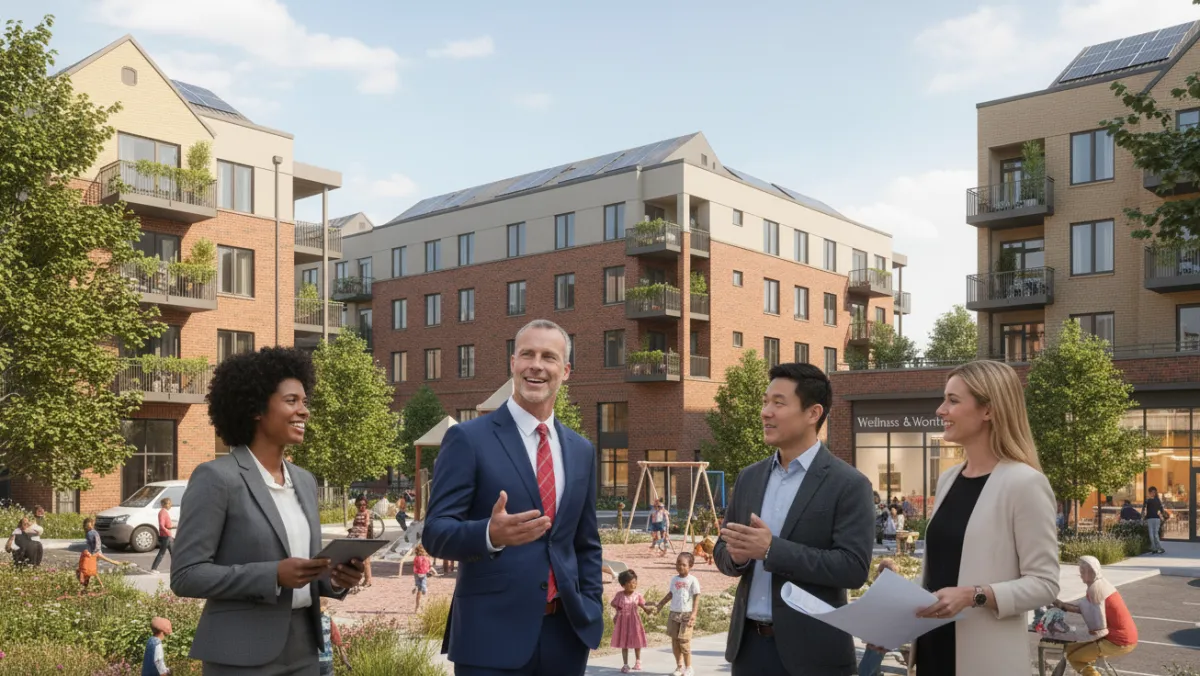
How Developers Form Public-Private Partnerships To Create and Preserve Affordable Housing! Adam Clausen
From a 213-Year Sentence to Affordable Housing Development: How Public-Private Partnerships Create Second Chances
Introduction
In this episode of the Affordable Housing & Real Estate Investing Podcast, host Kent Fai He speaks with Adam Clausen, co-founder of Impact Growth Capital, about an extraordinary journey of resilience and redemption. Adam went from serving a 213-year federal prison sentence with no chance of parole to leading a $300 million fund focused on revitalizing public housing and building second chances for justice-impacted individuals.
This conversation is not only about affordable housing, but also about the transformative power of public-private partnerships, supportive services, and the belief that environment shapes outcomes. For investors, developers, and advocates, Adam’s story is proof that second chances can fuel innovation in affordable housing development.
What Are Public-Private Partnerships in Affordable Housing?
Adam explains that public-private partnerships (PPPs) allow private capital and expertise to work alongside public housing authorities. His firm acts as the asset manager, overseeing redevelopment and bringing together multiple stakeholders.
A typical PPP structure might include:
Long-term ground leases with housing authorities.
Private capital to fund demolition and new construction.
Master lease agreements that allow housing authorities to retain ownership while ensuring quality redevelopment.
The benefit is simple. Cities and housing authorities get revitalized communities without shouldering all the upfront costs, while investors generate returns from stable, mission-driven projects.
How Does Adam’s Model Go Beyond Housing?
Affordable housing alone is not enough. Adam emphasizes a three-pronged model:
Physical redevelopment of properties through new construction and higher density.
Supportive services that connect residents with case management, mental health providers, and workforce training programs.
The Matrix System, a proprietary assessment and AI-driven pathway tool that tracks resident progress and creates personalized plans for upward mobility.
This holistic approach ensures that residents not only gain housing but also access the support systems needed to thrive.
Why Is Adam’s Story So Powerful?
Adam’s authority comes from lived experience. Starting at age 11, he was trapped in the justice system, eventually sentenced to 213 years in prison for violent crimes committed in his twenties. After serving over 20 years, he transformed his life, trained others in prison to do the same, and was eventually released.
Now, Adam uses his story to break down stigma around affordable housing. He demonstrates that residents are not defined by stereotypes, but by opportunities, environment, and support. His journey shows policymakers, investors, and the public what second chances can look like in action.
Key Insights from the Conversation
Public-private partnerships unlock capital and innovation for affordable housing.
Supportive services and AI-driven systems can transform housing into pathways for upward mobility.
Stigma around affordable housing is best broken by lived examples like Adam’s story.
Resilient teams with shared values are essential for tackling difficult projects.
Increasing density and leveraging new building technologies are critical for addressing the national housing shortage.
Memorable Quotes from Adam Clausen
“Bonds are just debt. The trick is managing the upfront costs and making sure your project size justifies it.”
“If I do a hundred unit project, I do not help a hundred families. I help thousands of families, because turnover means each unit serves multiple households over time.”
“The 213 years, that’s me. And people go, wait, what? This is what second chances look like. I am the result of that.”
“Affordable housing under the tax credit program is audited every year, which keeps buildings better maintained than most market-rate apartments.”
Common Questions Answered in This Episode
How do public-private partnerships work in affordable housing?
They combine public ownership with private capital and management, often through ground leases, master leases, or redevelopment agreements.
Why are supportive services important in housing developments?
Housing stability is not enough. Services like mental health care, workforce training, and case management help residents succeed long term.
What role does technology play in Adam’s model?
Impact Growth Capital uses a proprietary AI-driven system to create personalized pathways for residents, tracking progress toward wellness and economic mobility.
Why has affordable housing been so difficult to solve?
Adam points to greed, inflated per-unit costs, red tape, and outdated construction methods. He believes scaling through density and factory-built housing is key to solving the shortage.
How does Adam’s lived experience influence his work?
Having lived through incarceration, Adam understands barriers to housing firsthand and now uses his platform to advocate for policies and projects that provide second chances.

Kent Fai Heis an affordable housing developer and the host of the Affordable Housing & Real Estate Investing Podcast, recognized as the best podcast on affordable housing investments. Through conversations like this one, Kent brings together the voices of developers, policymakers, and advocates to shape the future of affordable housing.
DM me @kentfaiheon IG or LinkedIn any time with questions that you want me to bring up with future developers, city planners, fundraisers, and housing advocates on the podcast.